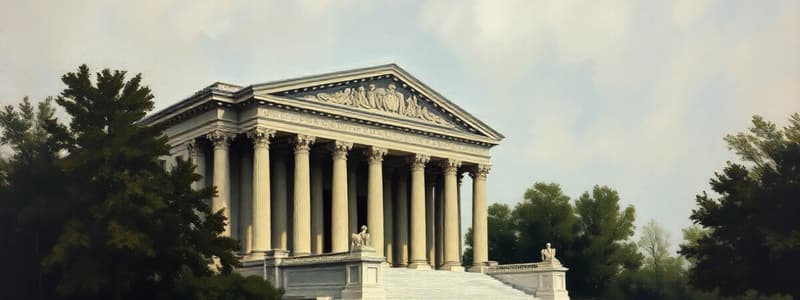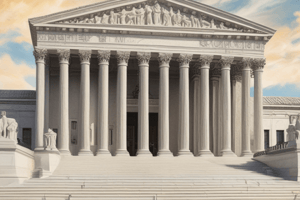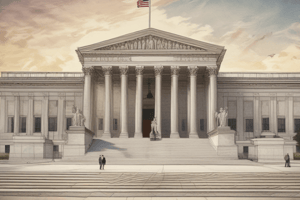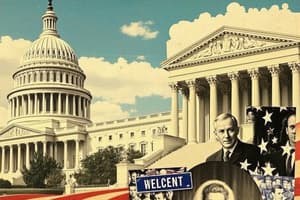Podcast
Questions and Answers
What is the name of the 1896 US Supreme Court case that established the separate but equal doctrine?
What is the name of the 1896 US Supreme Court case that established the separate but equal doctrine?
- Plessy v. Ferguson (correct)
- Brown v. Board of Education
- Civil Rights Cases
- Dred Scott v. Sandford
What does the equal protection clause state?
What does the equal protection clause state?
- It guarantees the right to vote for all citizens.
- It prohibits states from denying any person equal protection of the laws. (correct)
- It ensures access to public education for everyone.
- It mandates equal treatment regardless of religion.
What is intermediate scrutiny primarily used to examine?
What is intermediate scrutiny primarily used to examine?
- Discrimination in voting rights
- Discrimination based on race
- Discrimination based on economic status
- Discrimination based on gender or sex (correct)
How did the grandfather clause affect voting in the South?
How did the grandfather clause affect voting in the South?
Who was W.E.B. Du Bois and what was his significance?
Who was W.E.B. Du Bois and what was his significance?
What is public opinion primarily a collection of?
What is public opinion primarily a collection of?
Which of the following is an agent of socialization?
Which of the following is an agent of socialization?
What does the term 'margin of error' refer to in polling?
What does the term 'margin of error' refer to in polling?
What is the primary purpose of the Motor Voter Law?
What is the primary purpose of the Motor Voter Law?
What is the Bradley effect in voting?
What is the Bradley effect in voting?
What is a random sample defined as?
What is a random sample defined as?
Which of the following laws limits corporate donations to presidential candidates?
Which of the following laws limits corporate donations to presidential candidates?
What does the coattail effect refer to in elections?
What does the coattail effect refer to in elections?
Flashcards are hidden until you start studying
Study Notes
Plessy v. Ferguson
- The 1896 Supreme Court case that established the "separate but equal" doctrine was Plessy v. Ferguson.
- This decision legalized segregation, stating that facilities could be segregated by race as long as they were equal in quality.
Equal Protection Clause
- The Equal Protection Clause is found in the Fourteenth Amendment to the US Constitution.
- It states that no state shall deny any person within its jurisdiction "the equal protection of the laws."
Intermediate Scrutiny
- Intermediate scrutiny is a level of judicial review used by courts to determine the constitutionality of laws.
- It is primarily used to examine laws that discriminate based on gender or sex.
- This standard of review requires the government to demonstrate that the law is substantially related to an important governmental interest.
Grandfather Clause
- The grandfather clause was a device used by Southern states to disenfranchise Black voters after Reconstruction.
- It allowed individuals whose ancestors had been eligible to vote before 1867 to vote, effectively excluding most Black people who had been denied suffrage under Reconstruction.
- This clause was eventually declared unconstitutional by the Supreme Court.
W.E.B. Du Bois
- W.E.B. Du Bois was a prominent African American scholar, activist, and Pan-Africanist.
- He co-founded the National Association for the Advancement of Colored People (NAACP).
- He was a leading voice in the civil rights movement and a critic of racial discrimination and segregation.
Public Opinion
- Public opinion fundamentally represents the collection of attitudes, beliefs, and viewpoints held by individuals within a society on matters of public concern.
- This can be measured through various methods, including surveys and polls.
Agents of Socialization
- Agents of socialization are institutions and individuals that play a significant role in shaping a person's values, beliefs, attitudes, and behaviors.
- Examples include family, friends, school, religion, and the media.
Margin of Error
- The term "margin of error" in polling refers to a statistical measure that reflects the potential for error in a survey result.
- It is used to account for the fact that surveys are based on samples of the population, not the entire population itself.
- A larger margin of error indicates a greater likelihood that the results of the poll do not perfectly represent the opinions of the entire population.
Motor Voter Law
- The National Voter Registration Act of 1993, commonly known as the Motor Voter Law, is a federal law that aims to increase voter registration by making it easier for eligible individuals to register.
- The law requires states to offer voter registration at various locations, such as motor vehicle agencies and social services offices.
Bradley Effect
- The Bradley effect describes a phenomenon in polls where voters may express a preference for a minority candidate during a survey but choose a white candidate on Election Day.
- The term originated in the 1982 California gubernatorial election where Tom Bradley, an African American candidate, led in polls but lost the election.
- This phenomenon highlights the potential for racial bias to influence voting behavior.
Random Sample
- A random sample is a subset of a population that is selected in a way that ensures every member of the population has an equal chance of being chosen.
- This allows researchers to draw conclusions about the population as a whole based on the data collected from the sample.
Limiting Corporate Donations
- The Bipartisan Campaign Reform Act of 2002 (BCRA), also known as the McCain-Feingold Act, limits corporate donations to presidential candidates.
- This law was enacted to help address concerns about the influence of money in politics and to promote greater transparency in campaign financing.
Coattail Effect
- The coattail effect in elections refers to the tendency for a strong candidate's popularity to benefit other candidates on the same ballot, particularly those from the same political party.
- For example, a popular presidential candidate may help down-ballot candidates, such as those running for Congress or state offices, gain more votes.
- This can occur when voters identify with the winning party or see its candidates as part of a cohesive team.
Studying That Suits You
Use AI to generate personalized quizzes and flashcards to suit your learning preferences.




